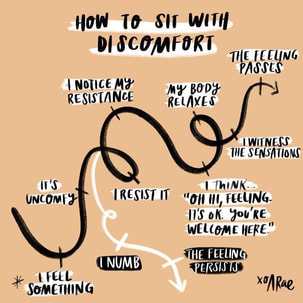But the problem is, the emotion doesn't just go away. It's still there, just beneath the surface, ready to spring into action the next time it gets triggered.
Often, our emotions contain important messages – they tell us so much when we're willing to listen to them. When we ignore them, we experience higher levels of stress, anxiety, and general discontent. A key characteristic of developing Emotional Mastery is being able to create a deliberate pause between impulse (what you feel) and response (ways you typically avoid the feeling). What if instead, you could simply sit with the emotion – allowing a space for it and just noticing it, while resisting the urge to act? When we can practice noticing and allowing our emotions, we experience a choice point. As much as it may not seem like it at times, we can choose in that moment to stay with what we're feeling and not run away from it.
We can practice having those sensations and not getting swept away by them. We can practice putting a bit of distance between our core self and the thoughts and emotions we are experiencing. Practicing allowing your full range of emotions is not only brave, but so healthy. And the ironic part is that when we accept what we feel and allow it be there, instead of running and hiding from it, the feeling passes all on its own.
Go easy on yourself and be sure to ask for support from friends, family, or a professional if challenging emotions start to feel overwhelming. Self-compassion and healthy self-care are key components in navigating challenging emotions. Be good to you! *Please note that one size does not fit all and those who have mental health diagnoses or challenges in which their emotions are significantly debilitating may struggle with doing this practice. Often, it is not because of lack of effort, but that sitting with discomfort is simply beyond the scope of what they are currently able to manage on their own. In these cases, seeking help and support from a trained professional may be helpful. Learn More about Core-level Coaching AuthorLearn more about Bobbi Beuree, Nova Scotia-based Coach + Facilitator
0 Comments
|
AuthorBobbi Beuree, Certified CAN Coach + Facilitator is located Nova Scotia and provides interactive 1:1 coaching services, as well as group coaching events. Archives
March 2024
Blog list: |
- Home
- About
- Connect
- Blog
- Why Coaching?
-
Key Topics
- Stress Management
- Practicing Healthy Self-Care
- Dealing with Difficult Emotions
- Thinking Traps and Limiting Beliefs
- Procrastination and Lack of Motivation
- Gaining Control Over Habits
- Life Direction
- Mindfulness
- Emotional Intelligence
- Self-Management
- Interpersonal Relationships
- Anxiety
- Perfectionism
- Self-Esteem + Self-Confidence





